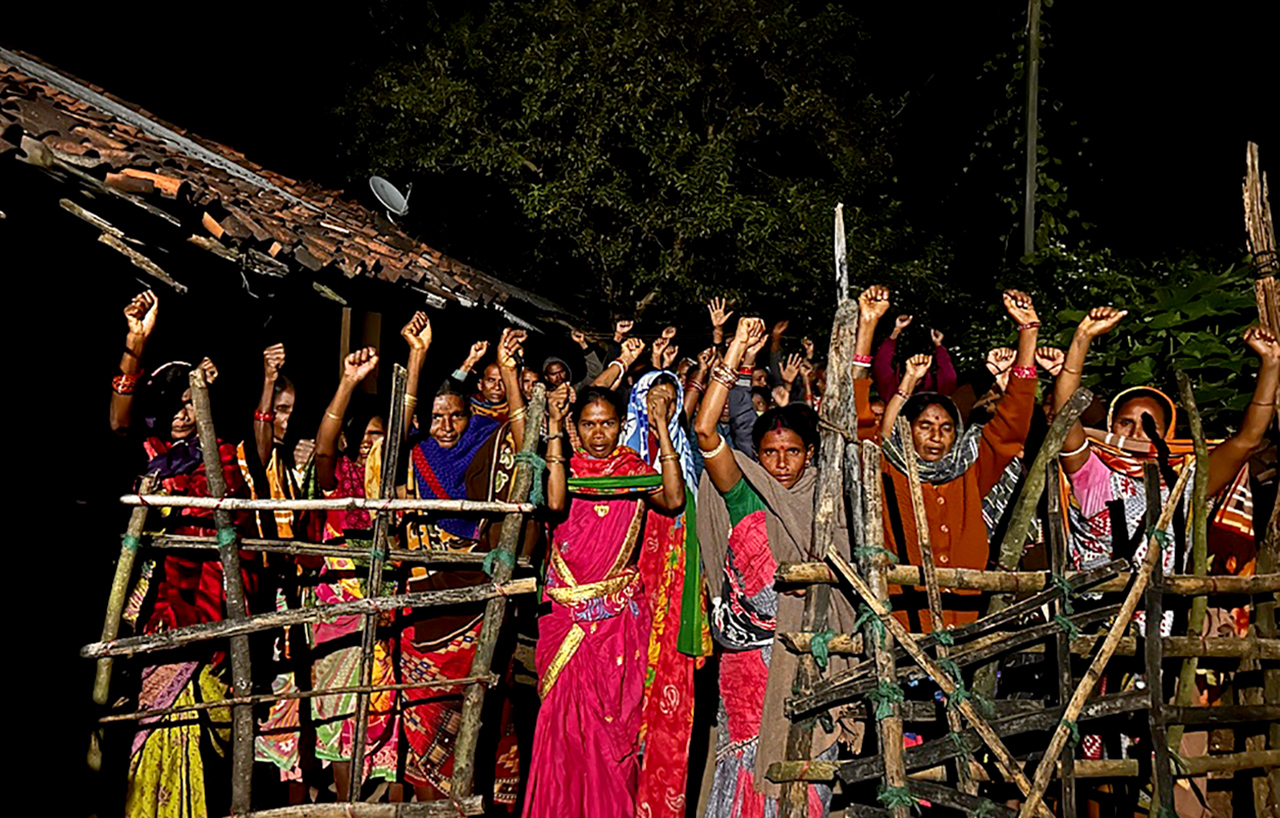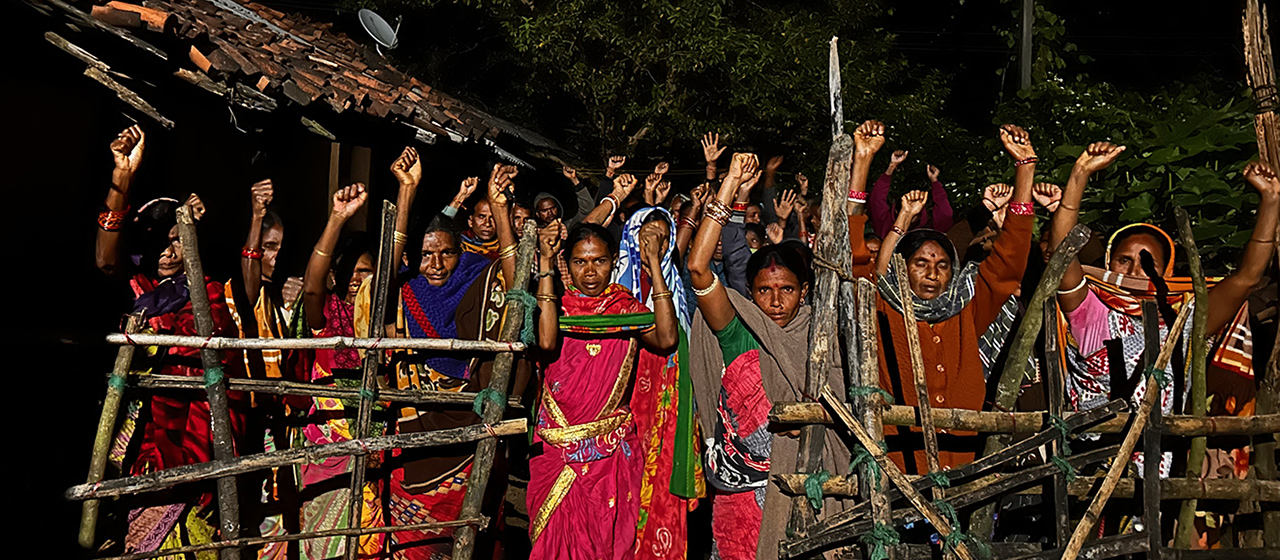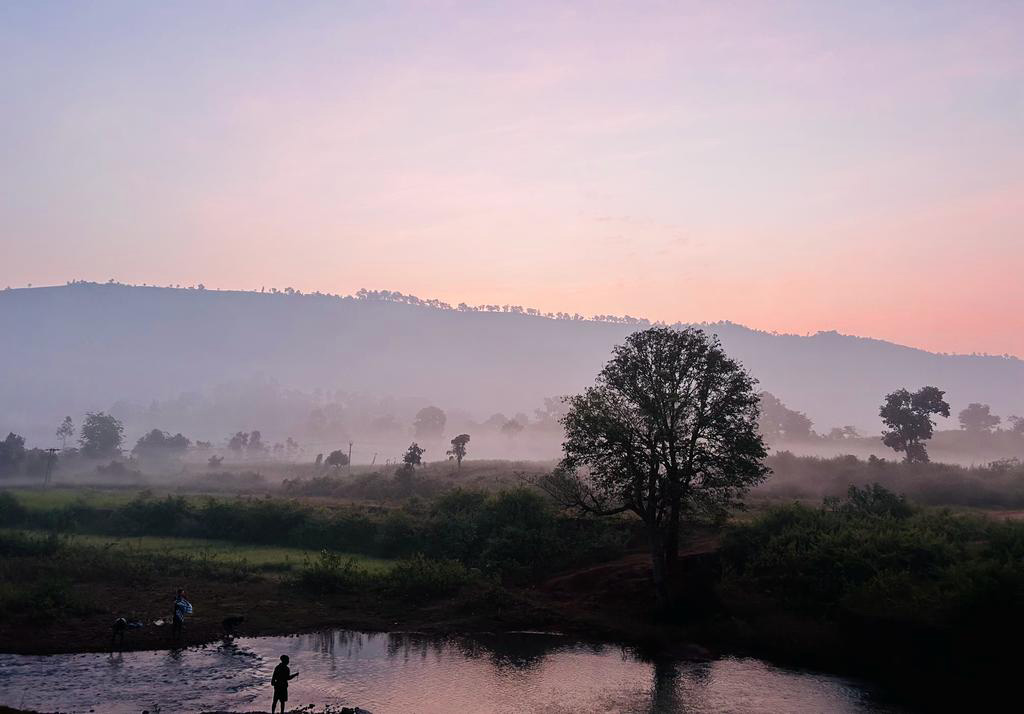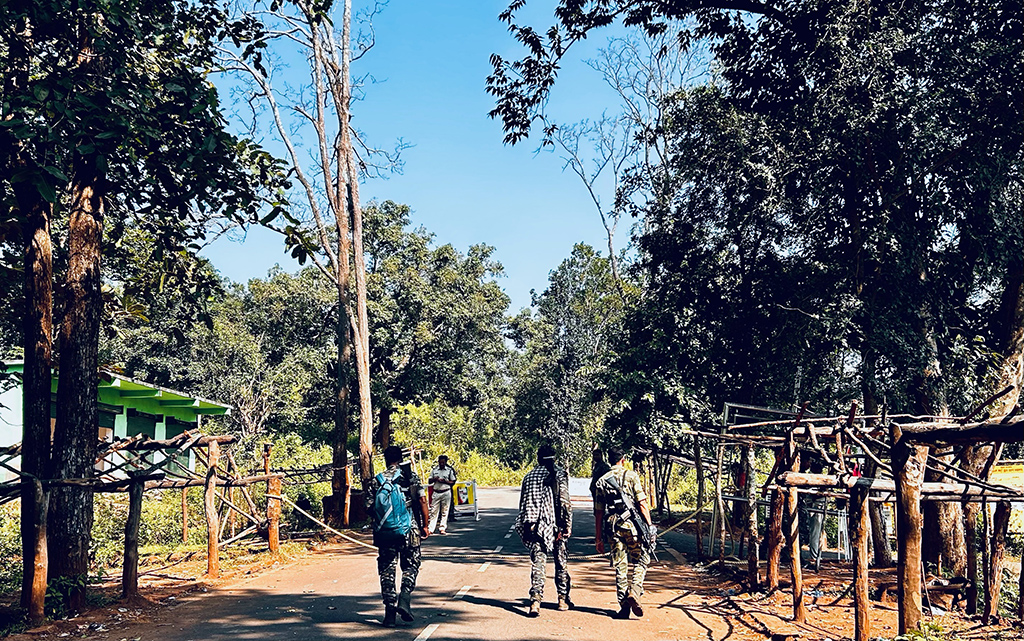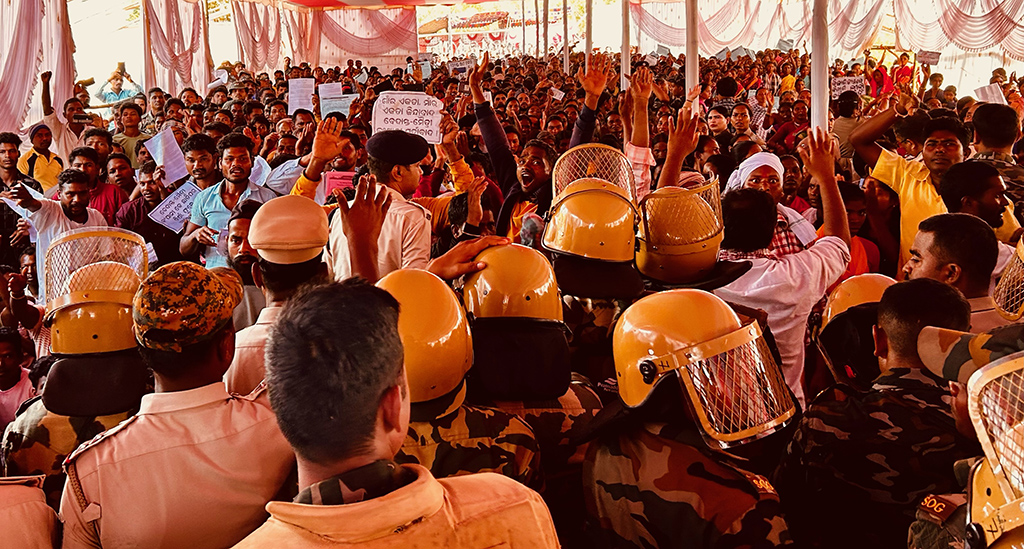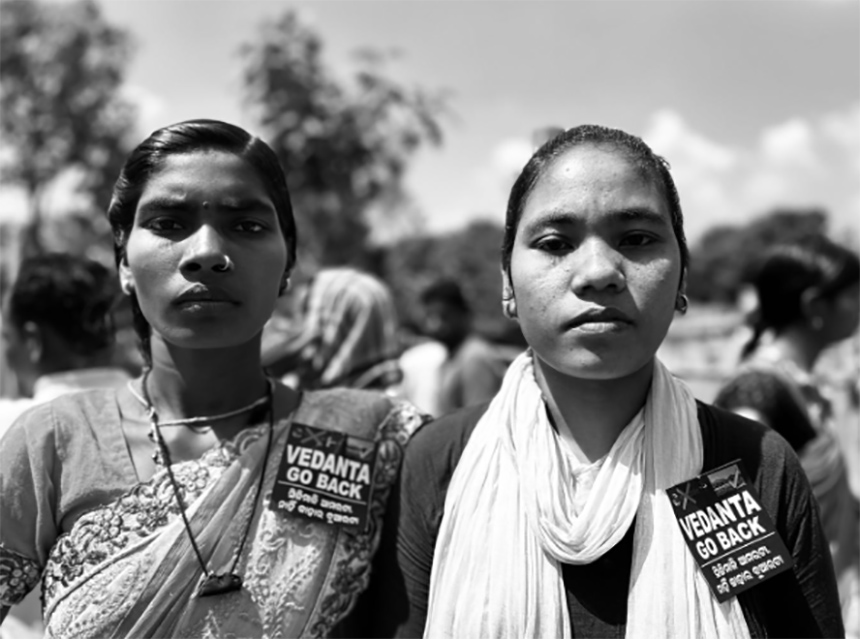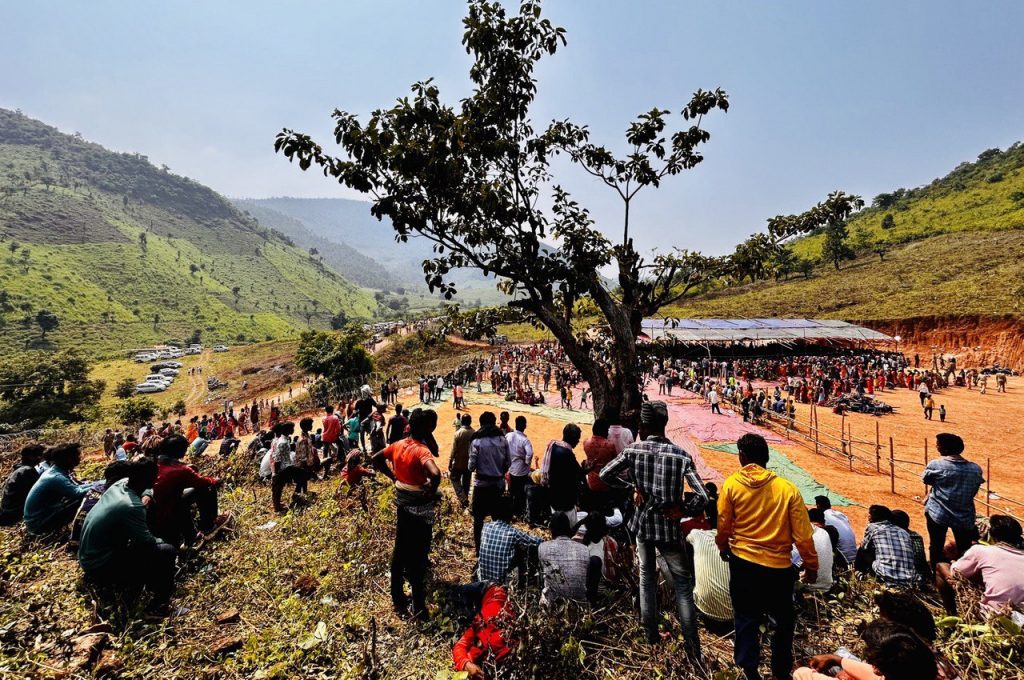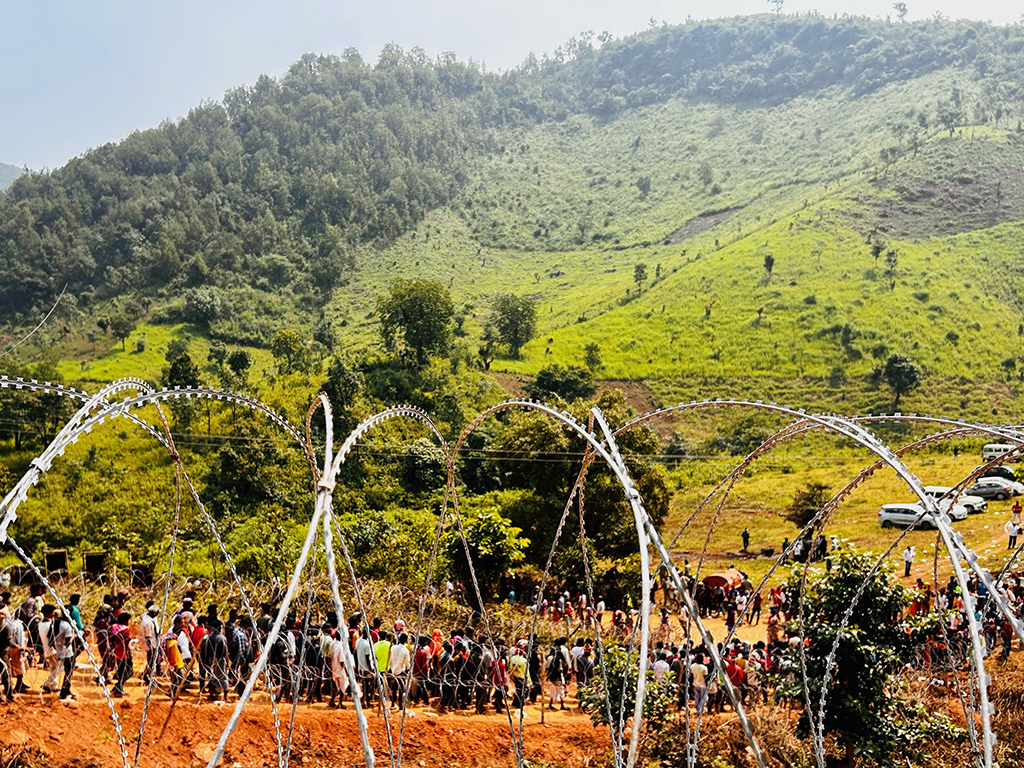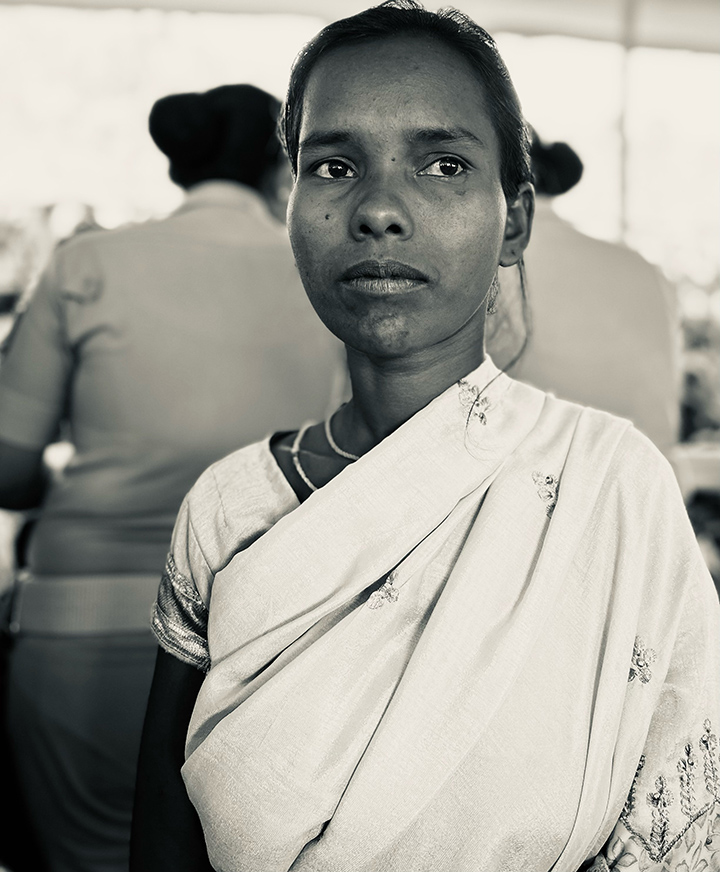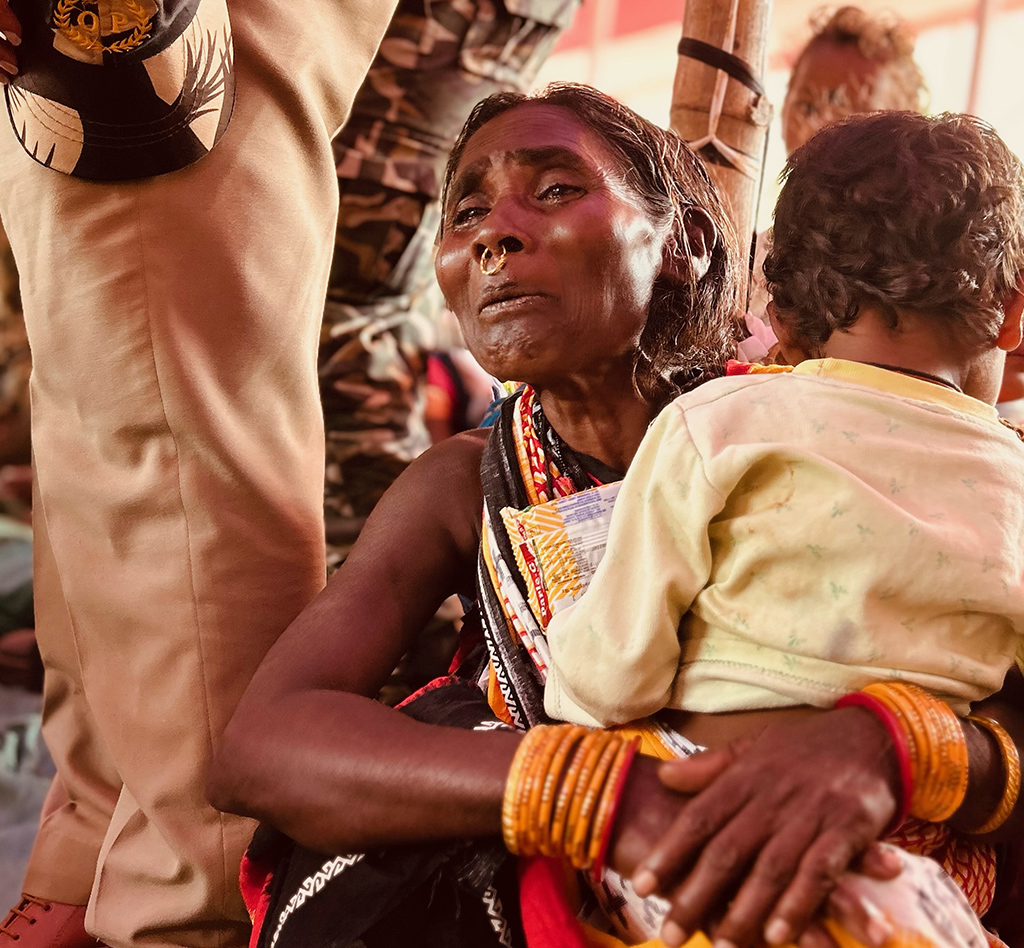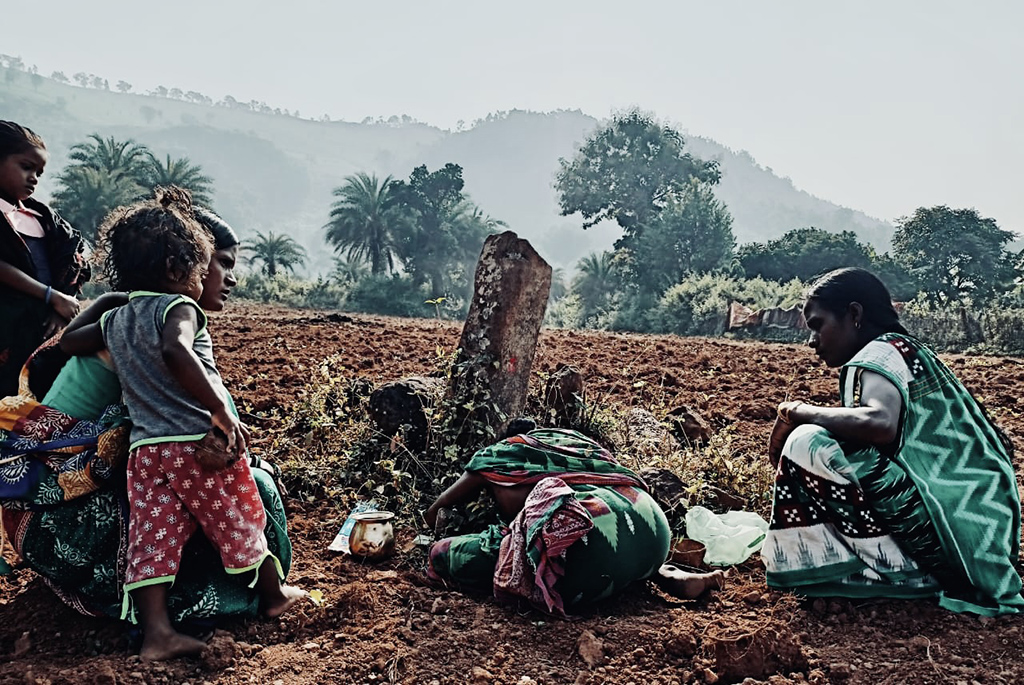Her story in photos of two public hearings for environment clearance to Vedanta’s bauxite mining proposal in Rayagada and Kalahandi districts, Odisha
By Rajaraman, Debabrata and Evanjelina.
Women of Banteji village, in the foothills of Tijmali, collectively resolve to oppose bauxite mining on the night before the public hearing of 16th October 2023 to be held at Sunger Panchayat, Kashipur block, Rayagada, Odisha
We are children of Tijraja, how can we allow our Tijmali to be mined?
Tijmali is our soul, how can we live without our soul?
Mining will destroy not just the streams but our identity; how can we allow that to happen?
We shall fight for our mali parbat, our forests, by all means, but will not let Vedanta mine our soul.
Adivasi and Dalit communities (Indigenous) since generations have been custodians of Tijmali, abundant in rich bio-cultural diversity. Tijmali gets its name from the local legend, Tijraja, whose abode is Tijmali and is worshipped as the supreme deity of the hills. Tijmali, (referred to in government records as ‘Sijimali’) is an example of continuing historical misappropriation of Indigenous spatial categories, and its inter-relations with their spiritual life worlds. It is part of the 1000 sq km long southern stretch of Eastern Ghats range, spreading over both Thuamul Rampur block of Kalahandi and Kashipur block of Rayagada districts in Odisha. Thuamul Rampur block in Kalahandi and Rayagada district in total are constitutionally designated Schedule V areas.
The hill has several neighbouring mountain peaks like Sasubaumali, Batingmali, Majingmali, Kutrumali and Khandualmali. Each of these mali-meaning mountains has rich socio-bio-cultural significance in the life-worlds of Indigenous populations who inhabit these regions. The Eco-Sensitive Zone (ESZ) of Karlapat Wildlife Sanctuary, known as a natural elephant, tiger and pangolin habitat, and adjacent to Khandualmali in Thuamul Rampur block, lies in close proximity to the proposed mining site, Tijmali hills.

On March 1st, 2023, Vedanta Limited received a Letter of Intent from Government of Odisha’s Steel & Mines Department as the preferred bidder for bauxite mining in Tijmali over an area of over 1549.022 hectares (equivalent to nearly 1880 football fields). Vedanta has proposed to extract 9 million tons per annum from the estimated bauxite reserve of 311 million tons.
On 14th August, MoEF&CC, granted Vedanta a Terms of Reference (ToR) under Environment Impact Assessment (EIA) Notification, 2006. Within a month, on 13th September 2023, Odisha’s State Pollution Control Board (OSPCB) put up notices for conduction of public hearings, a mandatory process for companies to obtain environmental clearance. “The draft EIA report submitted by Vedanta as part of this process, has suppressed vital information about Tijmali and the studies conducted for this report are based on erroneous claims. This gives Vedanta enough room to evade accountability and show itself as being committed to its principal claim of mining ‘responsibly’ (sic!). This dubious claim has no precedence in history,” says a wildlife biologist who studied Vedanta’s EIA report and doesn’t want to be named.
The draft EIA shows that data gathering on various ecological elements was undertaken in the periods prior to issuance of ToR which mandates that EIA studies must cover other periods of the year for proper assessment of a habitat and movement of wildlife across any mining lease area. “The biological study submitted as part of the draft EIA clearly shows that the proposed area has been a rich habitat and a corridor for diverse wildlife species, particularly Schedule (I) under Wildlife Protection Act, 1972. The draft EIA does not identify all the potential risks to the environment or expand the complexities of the impacts of its mining on not only the environment but also the people living in the region,” adds the wildlife biologist. Contrary to claims made in the draft EIA of the proposed project affecting 18 villages, local people say it will affect more than 50 villages across the region.
It must be noted that since the mine lease area of Tijmali falls across two administrative districts – Rayagada and Kalahandi, as per the EIA notification, 2006 there must be separate public hearings for each district. Accordingly, the first public hearing was held on 16th October 2023 at Sunger Panchayat of Kashipur block for Rayagada, and the second on 18th October 2023 at Kerpai Panchayat of Thuamul Rampur block for Kalahandi.
More than a week before Vedanta received its ToR, its mine developing operator Mythri Infrastructure and Mining India sent its staff to visit project affected villages for promising money and freebies to lure people in support of the mining project in the upcoming public hearing. On 30th July about 200 women, youth, and men of several villages protested Vedanta’s mining project and confronted the Mythri officials, reprimanding them for venturing into their villages without Gram Sabha approval. Following this, on 4th August 2023 hundreds of people gathered at Lakris village and again confronted the company officials for trying to bribe villagers into consenting to Vedanta’s mining project. Despite this, the company officials made several attempts to venture into the villages and go up to Tijmali hilltop.
It was alleged by several villagers that Mythri officials were involved in collecting bank account and Aadhar card details of people with the promise that they would deposit INR 1500 in return for their support of the mining project. On 12th August, during one such confrontation, the company agents on peoples’ demand, wrote a letter assuring villagers that they would not enter the area without prior consent.
In retaliation, Mythri officials registered five FIRs against villagers on different dates at Kashipur police station accusing about 95 persons of threatening and assaulting them with axes, lathis and taking them hostage.
The fallout of these FIRs was that from the night of 13th August as many as 21 people were arrested from six villages and sent to Rayagada Sub-jail. The remaining continue to face persecution as they are charged under several IPC sections like 307 and 364 which amounts to murder and rioting. Tijmali’s defenders live in a state of fear anticipating police crackdown at any time due to the continuous police patrolling. Police and paramilitary checkpoints at road junctures and village entry points continued till the recent public hearings.
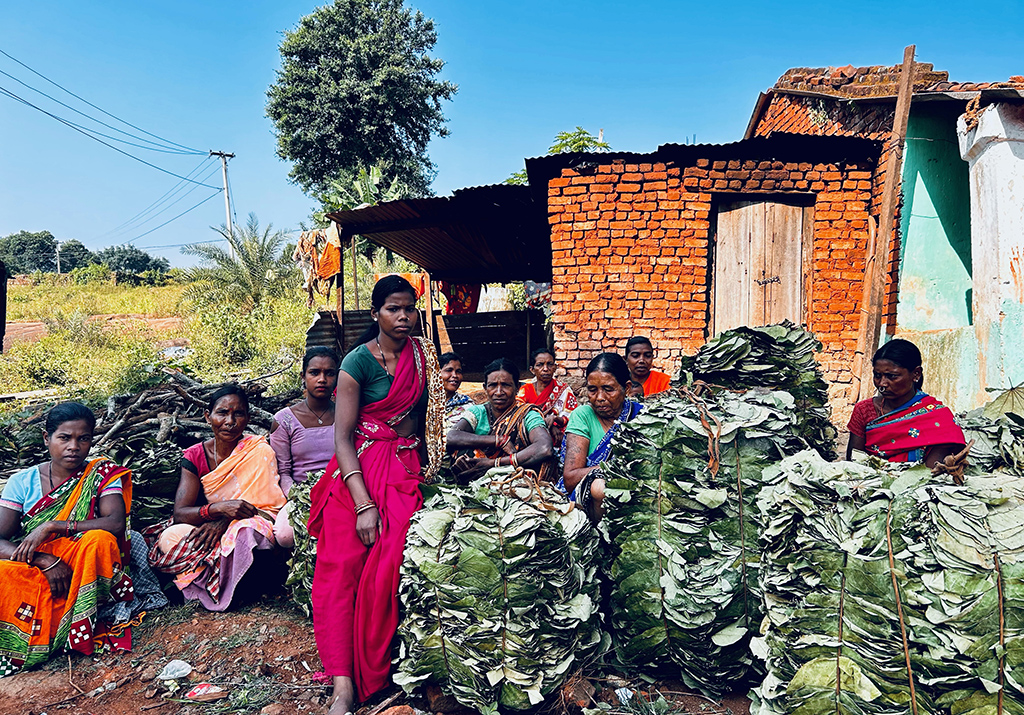
Several women have arrived from Tijmali hilltop after spending hours collecting Siali (Bauhinia vahlii) leaves. One of the women, a 52-year-old kandha Adivasi elder, not wanting to be named, explained, “women know what Tijmali means to us. There are more than 50 caves in Tijmali, like Bagpar, Gumedapar, Ranipar, Jitajharanpar (par refers to cave) which are sacred to us. We conduct rituals during different seasons in these caves. Wouldn’t mining destroy these caves? Besides, Tijmali is the main source of water for us. Panichida or as some call it Swadhgad is one the main sources of water to several streams that flow to our farms and villages. Mining will destroy 200 odd streams and their sources. How will we, the trees and animals survive then? We go to the hilltop to collect honey, amla (gooseberry), tamarind, guava, jamun (blackberry), jhuna (resins) and phul jhadu (hill broom). All these have medicinal values, and we sell them for our livelihood too. Will these remain if mining happens in Tijmali?”
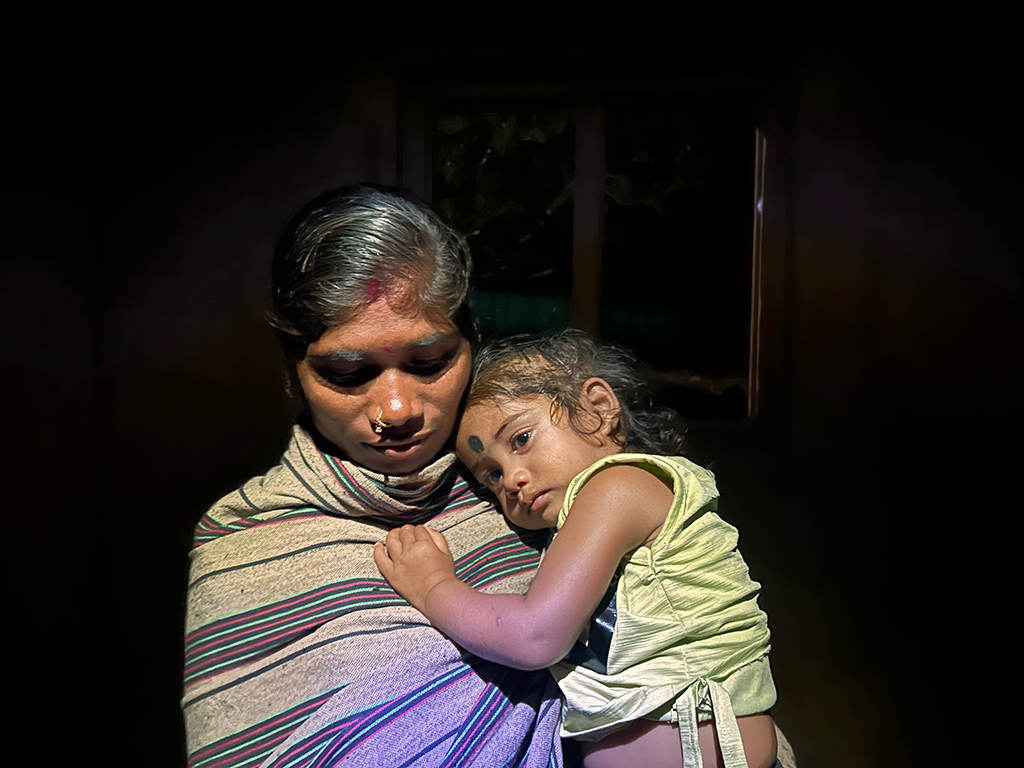
Manjula Nayak, 24 years, Dalit farmer from Banteji, has two children and is determined to save the hills from mining. Her partner, Kartika Nayak, she says, “vehemently opposes the mining of the hills and that is why the police is targeting him. Because of the frequent midnight raids, youth and elders from our village are hiding in the forests. Life has become miserable for us since Vedanta-Mythri arrived here.”
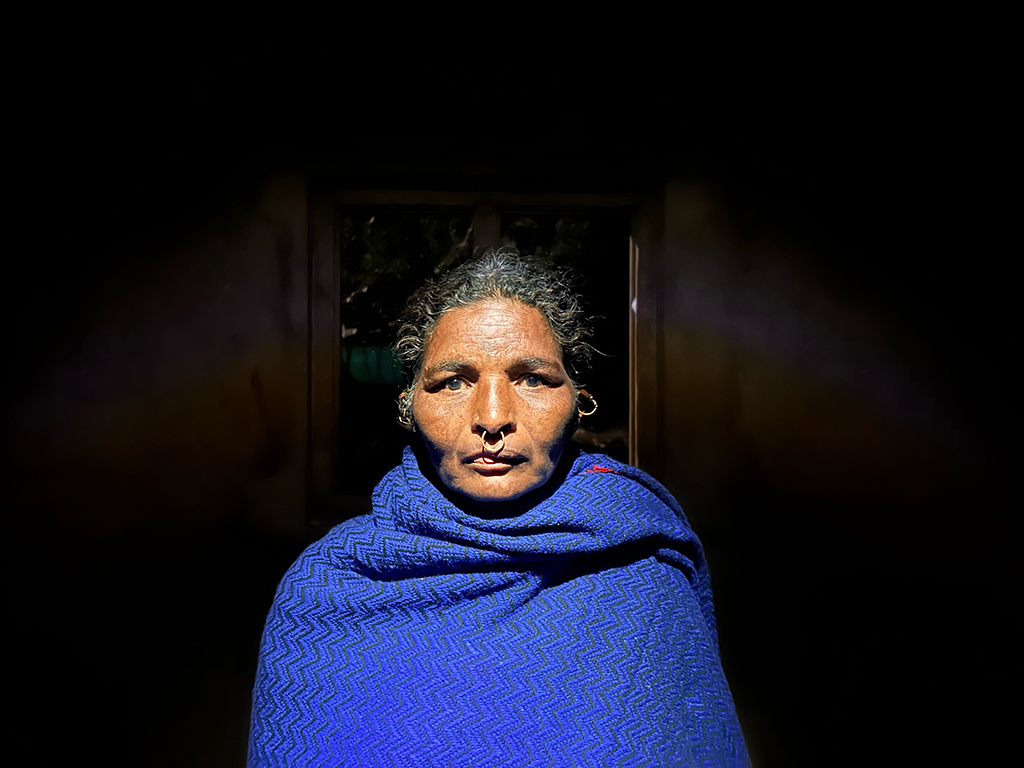
Ranidei Majhi, 45 years, Kandha Adivasi farmer from Banteji, speaking about her community’s relationship with Tijmali said, “we grow Mandia (finger millets), Kosala (little millets), Kangu (foxtail millets), Jhudung (long beans), Biri (black gram) in the mountains. We collect about 15-20 varieties of tubers like Semilikanda (cassava), Ranikanda (sweet potato) along with Kardi (bamboo shoots) and many such forest foods from the hills. Tijmali has medicinal plants too for stomach ache, fever, malaria, sickle cell anemia, diabetes, etc. How shall we forgo all this? We offer our prayers every year to Tijraja, whose abode is Tijmali. How can we survive without Tijmali if it is cut open and the water source of hundreds of streams destroyed?”
On 16th October, several check posts were set up across the inter-district border leading up to the public hearing venue by the police and paramilitary. Several community leaders reported that they came walking to the venue, taking a different route through the forests.
Malaya Nayak, Dalit farmer from Khakes village in Kalahandi, was forced to return home by the police from the borders for not carrying an Aadhar card. He asked the police personnel in anger, “the water that flows from Tijmali to our area, does it seek permission from the officers before entering Rayagada or Kalahandi? The water that originates from Tijmali reaches Kalahandi and flows ahead as Nagabali, whose permission has it taken?” Like Malaya, several others were stopped from crossing the borders or forced to return home at various checkpoints for not carrying Aadhar cards.
Despite heavy repression and threat of arrests, hundreds of people from villages across Tijmali gathered at the public hearing venue at Sunger chanting slogans ‘Vedanta-Mythri Company, go back’. Placards reading ‘Tijmali is ours, not anyone’s private property to be mined’ filled the venue. Amidst heavy deployment of police and 8 platoons of paramilitary personnel, nearly 2000 people unitedly showed their dissent at the public hearing.
Bharati Nayak, 25 years Dalit youth leader (left) and Namita Majhi, 24 years Adivasi youth leader (right) from Kantamal proudly wore badges with ‘Vedanta Go Back’. Bharati and Namita were among the 20 odd speakers at the public hearing on 16th October.
Bharati questioned the Additional District Magistrate if he had ever visited the villages of Tijmali before. Rayagada is a Schedule V district under the Constitution (it has 58.5% Adivasi population) where Panchayat Extension to Scheduled Areas Act (PESA), 1996 applies and in this context, Bharati challenged the officials, “has the district administration consulted the Gram Sabhas before auctioning Tijmali to Vedanta?”
Namita spoke powerfully about how their ancestors nurtured the lands, forests, and mountains of Tijmali. She asserted, “we will never leave the mountains and lands which are our mothers who feed us. How can we allow the destruction of our mother by mining? It will pollute the environment and displace us from our lands and livelihoods.” Namita also questioned the Odisha police, “for whose protection are you there? Us, the people, or a private company like Vedanta?”
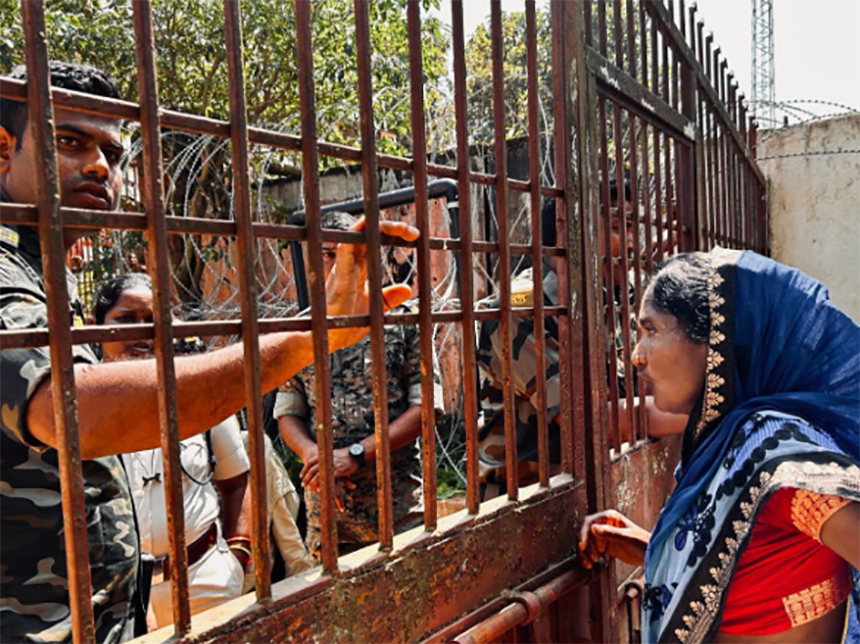
A distressed and agonised Laxmi Nayak, 45 years of Banteji, questioning the police at the gate of the public hearing venue. Laxmi wanted to share her grief and concerns, but did not get a chance to speak. Her partner, Tankadhar Nayak, an elder of Tijmali, is being hounded by the police for opposing the mines. Tankadhar had to flee several times to the forests with fellow villagers to avoid police repression.
On 7th October, around 5 pm, Laxmi quickly locked her house, wanting to run away into the forests, apprehending arrest as she saw the police approaching her. As the police personnel snatched the keys from her, she cleverly dodged them and ran away into the forests. The police team, despite having her house keys, broke open the doors, damaged the locks and stole valuables from her house.
“The police stole gold and silver jewellery and around 50,000 in cash kept for emergency purposes. What will we do if the police themselves steal? I want to file a complaint, but I’m afraid. What if the police arrest me or my husband when we go to the police station?” Laxmi fumed.
The second public hearing for Kalahandi at Kerpai Gram Panchayat on 18th October was held amid heavy deployment of police and paramilitary personnel. The entire public hearing venue was fenced with razor wires. More than 2000 people from across Tijmali attended the public hearing, continuously raising slogans ‘Vedanta-Mythri company, Go back’. Many people reported that they came walking through the forest routes as the police had set up check posts at major junctions leading to the public hearing venue.
Lilen Majhi 32 years, kandha Adivasi farmer from Tadadei village, was one among the 15 odd speakers at the Kerpai hearing. Lilen expressed her worry saying, “how can we destroy mother earth? All of us have been really worried since the last several months. These forests and mountains were guarded by our ancestors. These mountains don’t belong to the government or the company. We are crying today when you (pointing to the officials) are forcing on us this destruction in the name of development”. She added, “Today, the company might have bought over the collector, police and government officials for their selfish gains, but what will happen to the people of this land and its future generations? The government must immediately return the money it has accepted from the company and cancel the lease”.
Ruduna Nayak, 53 years, from Banteji village came walking to the public hearing from almost 45 kms away, carrying her grandchild, with the hope that she would get a chance to share her grief. She wasn’t allowed to speak. Rather she was whisked away by the police and company agents. Ruduna’s eldest son, Umakanta Nayak, was one of the first to be arrested by police. He remains in jail. In a separate interview, Ruduna said, “it’s been more than three months since police have taken away my son and put him in jail because he opposed mining. I have been crying every day anticipating his return. I wanted to question why the government is harassing us, but they did not allow me to speak.”
Kandha shamans of Talaampadar invoking Tijraja, Budharaja and Niyamraja, the supreme deities of the region, to stand with them in their fight against the destruction of their life-worlds. People are determined to protect Tijmali from Vedanta’s mining not because they are dependent on it for livelihoods alone, but because it is deeply intertwined with their knowledge, identity and dignity.
Photographs : Rajaraman Sundaresan
ABOUT THE AUTHORS
Rajaraman is a student of Indigenous movements and Special Correspondent, Odisha with Samadrusti media, Bhubaneswar.
Evanjelina is a curator for the media campaigns of Indigenous peoples’ Land, Life and Knowledge collective.
Debabrata is an independent journalist who writes for several Odiya newspapers on human rights issues in Odisha.

